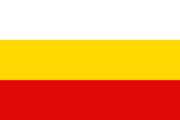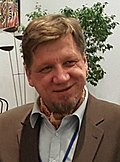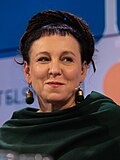User:Ostry/Sandbox5: Difference between revisions
| Line 347: | Line 347: | ||
==See also== | ==See also== | ||
==Upper Elsian Territory== | |||
=Elections= | =Elections= | ||
===26-27 February 2000=== | ===26-27 February 2000=== | ||
Revision as of 23:14, 24 August 2022
Free City of Elstock | |
|---|---|
| Motto: "Per lucem et fidem" "By light and faith" | |
| Anthem: O krôjnié rzéki / O Land des Flusses O land of the river | |
| Capital and largest city | Elstock (city-state) |
| Official languages | Elsian, Tyrnican |
| Ethnic groups (2020) | 55.9% Elsian 27.8% Tyrnican 7.2% Rasmi 5.5% Senian 3.6% Other |
| Religion (2020) | 36.4% Classical 29.9% Apostolic 21.2% Irreligious 10.6% Aulaist 2.0% Other |
| Demonym(s) | Elstocker |
| Government | Unitary directorial parliamentary republic |
| Jón Ritter Rupert Pohl | |
| Legislature | Senate |
| Area | |
• Total | 120 km2 (46 sq mi) |
• Water (%) | 10.5 |
| Population | |
• 2020 census | 241,490 |
• Density | 2,012/km2 (5,211.1/sq mi) |
| GDP (PPP) | 2021 estimate |
• Total | $14.55 billion |
• Per capita | $60,255 |
| GDP (nominal) | 2021 estimate |
• Total | $12.81 billion |
• Per capita | $53,025 |
| HDI (2020) | very high |
| Currency | Commonwealth mark (M) (COM) |
| Time zone | UTC+1 (Central Auressian Time) |
• Summer (DST) | UTC+2 (Central Auressian Summer Time) |
| Driving side | left |
| Calling code | +07 22 |
| ISO 3166 code | EL |
| Internet TLD | .el |
Elstock (Elsian: Elstók), officially the Free City of Elstock (Elsian: Wòlny Gard Elstók; Tyrnican: Freie Stadt Elstock), is a city state [WIP]
Etymology
Numerous linguists attest that the native name of Elstock (Elstók in Elsian) derives from the Ludic term Elstoc (*els-tokŭ, or "fork of the Els"), named after the river Els that runs through the city before draining into the Bay of Elstock. Before the Elsian language was standardized in the 19th century, the port previously appeared in documents as alternatively Elstik, Alztyk, Elztuk, and Elczók.
The Tyrnican Elstock is also assumed to be derived from the original Ludic term, and has in the past appeared as Elsstok, Elßtok, Alstock, or Elztock in various historical documents.
History
Early history
- Initially founded around the 10th century as a gord (fortified settlement) by the Ludic Elsians. Emerges as a notable place of trade between the Elsians and Tyrnicans from the west.
- By 11th century, a confederation of Elsian chiefs is attested, also referred to as the Elesi. Little information exists, but is often considered the first Elsian proto-state.
- The region quickly becomes influenced by Tyrnica, and in 1224, the monastic Order of Saint Perende beseige and occupy Elstock and other gords in Elsia in an attempt to Perendize the Ludic peoples to Tyrnica’s east. The monastic Elsian March (Marca elsica, Elsische Mark) is created along the river Els, with the order making Elstock their seat.
Elsian March
- Elstock’s annexation into the Elsian March sees the city boom as a centre of culture and trade during the medieval period, with the city becoming an integral part of north Auressian trade routes, especially in the production and trade of amber. The Monk’s Castle (the primary seat of the Steward, the nominal head of the order) finishes its construction in 1267.
- The University of Elstock is founded in 1298. The university remains an important and prestigious symbol of Elstock and Auressian higher education to the present day.
- Throughout the medieval period, Elstock and Elsia writ large are Perendized and brought under the control of the Order of Saint Perende, and a ruling class of Tyrican monks, knights, and a fledgling merchant class lord over the still-majority Elsian population of the river valley. The Rasmi, a religious group originally from further east, begin to migrate towards Elsia as a source of livelihood and to flee persecution, with the Order allowing notable tolerance towards the Rasmi due to their reputation as blacksmiths and horseback riders, skills that could be co-opted for the March.
Decline and the early modern period
- In the early 1500s, the Elsian March, already on the decline for decades from external forces, erupts into civil war as the local Apostolic Church faces splintering and the political clout of monastic rule falters. Although Elstiock itself stays within the order’s control, the rest of Elsia either forms their own entities or are subsumed by larger neighbours. Attempts to secular the March fail as Elstock enters a period of decline, albeit remaining an important tradeport.
- In 1677, Elstock, now the final holdout of the Order of Saint Perende, is quickly and quietly annexed by Pelemia after a short blockade. Initially, the city is granted high autonomy, with much of the power remaining in the former monastic class, leading to tension with a now substantial merchant class consisting of both Elsians and Tyrnicans.
- In the 17th and 18th centuries, with nation-building and the formation of proto-nationalism occurring in Pelemia and elsewhere in the region, pressure is placed on Elsians to integrate and assimilate to larger Tyrnican and Severny populations, often with harsh reprisals. These efforts of “Trynicanization” and “Severnization” would become more severe in the 19th century.
19th century
- The Tyrnican Century affects and influences Elstock immensely, with the city increasing trade with the influential neighbour. The construction of the Elstock-Ardarschweig railway line in 1836 (and the neoclassical Amber Square Station) precedes both an economic boom and the rise of tourism to the city from the rest of Pelemia and abroad, especially from Tyrnica. The Elstocker Casino is opened in 1859, beginning the city’s long relationship with the gambling industry, alongside a number of luxury hotels catering to the Auressian nobility and elite as Elstock gains notoriety as “the playground of the rich and famous” of Auressia.
- As Elstock itself sees a revival, the Elsians within Pelemia and Tyrnica are further burdened by restrictive policies and forced resettlement. In Elstock itself, Pelemian authorities favour the local Tyrnican-speaking ruling class, and the Elsian language is de facto banned in 1850. The situation worsens in Elsia proper with even more invasive policies around banning permanent housing and land ownership, in an attempt to settle Severny in the Els river valley. In response, a fervent (and often violent) Elsian nationalist movement forms. A famine in 1871 leads to mass death and migration to Marceunia, and a failed minor uprising by Elsian farmers protesting land seizures.
- In Elstock, Pelemian authorities crack down on Elsian nationalists through stripping the city’s autonomy. The position of Mayor is established in 1868 as a governor appointed by the Prince in order to keep order in the city. This fails, and tensions explode into numerous riots in the 1870s to the 1890s. In retaliation, Pelemia engages in a deliberate attempt to “starve out the dissidents” through government seizure of land and materials throughout Elsia. Estimates are vague, but roughly a quarter (250,000) of Elsians are either killed or flee the region during these events, although land seizures and language policies has more of an effect on the countryside than urban centres, leaving Elstock still-majority Elsian by the 20th century.
First Great War and the 20th century
- In [Tyrno-Pelemian War, ends 1901], Elsia forms the frontline of the war, with the Tyrnicans adopting harsh tactics of land and crop seizures as they push through the region. This, plus a occupying regime of torture and mass executions by the military make up the Rzëcniô ("Slaughter", more officially referred to as the Elsian Massacre), possibly the harshest period of persecution against the Elsians in the 19th and 20th century. Estimates as high as 400,000 (almost half of the population) are killed via these methods, and more displaced from their communities, sometimes collectively. The events of the Elsian Massacre are still a controversial subject today, and opinions are heavily debated if Tyrnica's actions constitute just war crimes or genocide, as well as the intent of Tyrnican officials. At the war's conclusion in 1901, Tyrnica annexes Elstock, alongside a swath of western Pelemia. The Elsian population of Elstock are quickly displeased as Tyrnican officials retain many of the Pelemian policies on language rights and an open favoritism towards the majority-Tyrnican elite of the city.
- The First Great War (1908-1914) devastates Elstock economically, as the city is placed in the crosshairs of both Galene League and Coalition armies via sea. The Battle of Elstock Bay becomes notable as one of the most destructivet naval battles of the war. In 1914, with an official end to the First Great War, Elstock is granted the status of a condominium, jointly ruled by Tyrnica and Pelemia initially under military rule, in an attempt to keep balance in the region while side-stepping the Elsian independence movement as a whole.
- Under the condominium agreement, Elstock begins to rebuild under the command of the two Mayors (a Tyrnican and Pelemian diplomat jointly serving as the city-state’s executive). A move to introduce an elected legislature is dropped in the 1930s with the outbreak of the Second Great War, in which Elstock became a noted drydock and hub for spies searching for intelligence in an officially neutral territory.
- With the end of the Second Great War in 1943, Elstock’s status as a condominium is questioned as de-colonization around the world begins. Some powers are given to an appointed local Senate in 1970, but most legislative power remains in the hands of the Mayors, and Elstock is used as a pawn between Tyrnica and Pelemia as tension remained from the early 20th century. In response to a lack of reform and local power, the Elsian People’s Army begins a bombing campaign around Elstock from the late 1950s until the early 1990s, hoping to liberate Elstock and Elsia as a whole from Tyrnican and Pelemian influence. In 1992, Tyrnica and Pelemia agree to ending the condominium, signing the Elstock accord. This leads to the election of a Constituent Assembly in 1998, and the independence of the Free City of Elstock on 1 January, 2000.
Post-independence
- Elstock’s constitution is based on the concept of consensus government, as an attempt to reign in external influence and keep peace with the divided city-state.
- Since independence in 2000, Tyrnican and Pelemian influence remain on Elstock, and the city-state remains a geopolitical battleground between the two powers, if now less violent than in the 20th century.
Geography
| Els | |
|---|---|
 | |
| Location | |
| Countries | Senia, Pelemia, Tyrnica, Elstock |
| Cities | Derov, Elstock |
| Physical characteristics | |
| Source | Eĺsogoŕsk, Senia |
| Mouth | Elstock |
| Discharge | |
| - location | Bay of Elstock |
Climate
Government
Transnational parties
Elsian People's Party Elsczi Partia Lëdowô | |
|---|---|
 | |
| Elsian name | Elsczi Partia Lëdowô |
| Dlin name | Ելսսիյսկայա Նարոդնայա Պարտիյա (Elssiyskaya Narodnaya Partiya) |
| Senian name | Эльска Партия Людовна (Eĺska Partyja Liudovna) |
| Tyrnican name | Elsische Volkspartei |
| Leader | Ôda Róg (Pelemia) Pioter Szlùsôrsczi (Senia) Antón Planck (Tyrnica) |
| Founded | 10 March 1895 |
| Newspaper | Samòstójnota |
| Youth wing | Młodi Elsëbë |
| Ideology | Elsian nationalism Democratic socialism Left-wing nationalism Republicanism Environmentalism |
| Political position | Left-wing |
| Colors | White Gold Red |
| Anthem | Të, Elskô ("You, Elsia") |
| Flag | |
 | |
| Website | |
| www.epl.tr | |
Administrative divisions
Elstock is divided into six districts (Elsian: dzélnicô; Tyrnican: Bezirk), with certain rights and responsibilities on the local level. The modern-day districts are based on the original four divisions of the city in the 18th century. Szmëlermark would be incorporated into Elstock in 1884, and Tónkowò in 1920.
- Stôrògard (lit. 'Old Town'; Altstadt)
- Nowògard (lit. 'New Town'; Neustadt)
- Fiszerstëk (Fischersteg)
- Ełwa (Elwa)
- Szmëlermark (Schmalermarkt)
- Tónkowò (Antonkow)
Foreign relations
Military
Police force
Economy
Tourism
Gambling
Fishing
Taxes
Population
Demographics
Language
Religion
Education
| Latin: Universitas Elstocensis | |
| Motto | Scientia per rationem |
|---|---|
Transport
Energy
Culture
Music
Sport
Cuisine
Public holidays and festivals
See also
Upper Elsian Territory
Elections
26-27 February 2000
| |||||||||||||||||||||||||||||||||||||||||||||||||||||
All 30 seats in the Senate 16 seats needed for a majority | |||||||||||||||||||||||||||||||||||||||||||||||||||||
|---|---|---|---|---|---|---|---|---|---|---|---|---|---|---|---|---|---|---|---|---|---|---|---|---|---|---|---|---|---|---|---|---|---|---|---|---|---|---|---|---|---|---|---|---|---|---|---|---|---|---|---|---|---|
| Turnout | 72.48% | ||||||||||||||||||||||||||||||||||||||||||||||||||||
| |||||||||||||||||||||||||||||||||||||||||||||||||||||
| |||||||||||||||||||||||||||||||||||||||||||||||||||||
22-23 February 2003
| |||||||||||||||||||||||||||||||||||||||||||||||||||||||||||||||||||||||
All 30 seats in the Senate 16 seats needed for a majority | |||||||||||||||||||||||||||||||||||||||||||||||||||||||||||||||||||||||
|---|---|---|---|---|---|---|---|---|---|---|---|---|---|---|---|---|---|---|---|---|---|---|---|---|---|---|---|---|---|---|---|---|---|---|---|---|---|---|---|---|---|---|---|---|---|---|---|---|---|---|---|---|---|---|---|---|---|---|---|---|---|---|---|---|---|---|---|---|---|---|---|
| Turnout | 69.83% ( | ||||||||||||||||||||||||||||||||||||||||||||||||||||||||||||||||||||||
| |||||||||||||||||||||||||||||||||||||||||||||||||||||||||||||||||||||||
| |||||||||||||||||||||||||||||||||||||||||||||||||||||||||||||||||||||||
25-26 February 2006
| |||||||||||||||||||||||||||||||||||||||||||||||||||||||||||||||||||||||
All 30 seats in the Senate 16 seats needed for a majority | |||||||||||||||||||||||||||||||||||||||||||||||||||||||||||||||||||||||
|---|---|---|---|---|---|---|---|---|---|---|---|---|---|---|---|---|---|---|---|---|---|---|---|---|---|---|---|---|---|---|---|---|---|---|---|---|---|---|---|---|---|---|---|---|---|---|---|---|---|---|---|---|---|---|---|---|---|---|---|---|---|---|---|---|---|---|---|---|---|---|---|
| Turnout | 71.45% ( | ||||||||||||||||||||||||||||||||||||||||||||||||||||||||||||||||||||||
| |||||||||||||||||||||||||||||||||||||||||||||||||||||||||||||||||||||||
| |||||||||||||||||||||||||||||||||||||||||||||||||||||||||||||||||||||||
21-22 February 2009
| |||||||||||||||||||||||||||||||||||||||||||||||||||||||||||||||||||||||||||||||||||||||||||||
All 30 seats in the Senate 16 seats needed for a majority | |||||||||||||||||||||||||||||||||||||||||||||||||||||||||||||||||||||||||||||||||||||||||||||
|---|---|---|---|---|---|---|---|---|---|---|---|---|---|---|---|---|---|---|---|---|---|---|---|---|---|---|---|---|---|---|---|---|---|---|---|---|---|---|---|---|---|---|---|---|---|---|---|---|---|---|---|---|---|---|---|---|---|---|---|---|---|---|---|---|---|---|---|---|---|---|---|---|---|---|---|---|---|---|---|---|---|---|---|---|---|---|---|---|---|---|---|---|---|
| Turnout | 54.18% ( | ||||||||||||||||||||||||||||||||||||||||||||||||||||||||||||||||||||||||||||||||||||||||||||
| |||||||||||||||||||||||||||||||||||||||||||||||||||||||||||||||||||||||||||||||||||||||||||||
| |||||||||||||||||||||||||||||||||||||||||||||||||||||||||||||||||||||||||||||||||||||||||||||
25-26 February 2012
| ||||||||||||||||||||||||||||||||||||||||||||||||||||||||||||||||||||||||||||||||||
All 30 seats in the Senate 16 seats needed for a majority | ||||||||||||||||||||||||||||||||||||||||||||||||||||||||||||||||||||||||||||||||||
|---|---|---|---|---|---|---|---|---|---|---|---|---|---|---|---|---|---|---|---|---|---|---|---|---|---|---|---|---|---|---|---|---|---|---|---|---|---|---|---|---|---|---|---|---|---|---|---|---|---|---|---|---|---|---|---|---|---|---|---|---|---|---|---|---|---|---|---|---|---|---|---|---|---|---|---|---|---|---|---|---|---|---|
| Turnout | 60.09% ( | |||||||||||||||||||||||||||||||||||||||||||||||||||||||||||||||||||||||||||||||||
| ||||||||||||||||||||||||||||||||||||||||||||||||||||||||||||||||||||||||||||||||||
| ||||||||||||||||||||||||||||||||||||||||||||||||||||||||||||||||||||||||||||||||||
21-22 February 2015
| |||||||||||||||||||||||||||||||||||||||||||||||||||||||||||||||||||||||||||||||||||||||||||||
All 30 seats in the Senate 16 seats needed for a majority | |||||||||||||||||||||||||||||||||||||||||||||||||||||||||||||||||||||||||||||||||||||||||||||
|---|---|---|---|---|---|---|---|---|---|---|---|---|---|---|---|---|---|---|---|---|---|---|---|---|---|---|---|---|---|---|---|---|---|---|---|---|---|---|---|---|---|---|---|---|---|---|---|---|---|---|---|---|---|---|---|---|---|---|---|---|---|---|---|---|---|---|---|---|---|---|---|---|---|---|---|---|---|---|---|---|---|---|---|---|---|---|---|---|---|---|---|---|---|
| Turnout | 62.34% ( | ||||||||||||||||||||||||||||||||||||||||||||||||||||||||||||||||||||||||||||||||||||||||||||
| |||||||||||||||||||||||||||||||||||||||||||||||||||||||||||||||||||||||||||||||||||||||||||||
| |||||||||||||||||||||||||||||||||||||||||||||||||||||||||||||||||||||||||||||||||||||||||||||
24-25 February 2018
| |||||||||||||||||||||||||||||||||||||||||||||||||||||||||||||||||||||||||||||||||||||||||||||
All 30 seats in the Senate 16 seats needed for a majority | |||||||||||||||||||||||||||||||||||||||||||||||||||||||||||||||||||||||||||||||||||||||||||||
|---|---|---|---|---|---|---|---|---|---|---|---|---|---|---|---|---|---|---|---|---|---|---|---|---|---|---|---|---|---|---|---|---|---|---|---|---|---|---|---|---|---|---|---|---|---|---|---|---|---|---|---|---|---|---|---|---|---|---|---|---|---|---|---|---|---|---|---|---|---|---|---|---|---|---|---|---|---|---|---|---|---|---|---|---|---|---|---|---|---|---|---|---|---|
| Turnout | 58.97% ( | ||||||||||||||||||||||||||||||||||||||||||||||||||||||||||||||||||||||||||||||||||||||||||||
| |||||||||||||||||||||||||||||||||||||||||||||||||||||||||||||||||||||||||||||||||||||||||||||
| |||||||||||||||||||||||||||||||||||||||||||||||||||||||||||||||||||||||||||||||||||||||||||||
27-28 February 2021
| |||||||||||||||||||||||||||||||||||||||||||||||||||||||||||||||||||||||||||||||||||||||||||||
All 30 seats in the Senate 16 seats needed for a majority | |||||||||||||||||||||||||||||||||||||||||||||||||||||||||||||||||||||||||||||||||||||||||||||
|---|---|---|---|---|---|---|---|---|---|---|---|---|---|---|---|---|---|---|---|---|---|---|---|---|---|---|---|---|---|---|---|---|---|---|---|---|---|---|---|---|---|---|---|---|---|---|---|---|---|---|---|---|---|---|---|---|---|---|---|---|---|---|---|---|---|---|---|---|---|---|---|---|---|---|---|---|---|---|---|---|---|---|---|---|---|---|---|---|---|---|---|---|---|
| Turnout | 66.78% ( | ||||||||||||||||||||||||||||||||||||||||||||||||||||||||||||||||||||||||||||||||||||||||||||
| |||||||||||||||||||||||||||||||||||||||||||||||||||||||||||||||||||||||||||||||||||||||||||||
| |||||||||||||||||||||||||||||||||||||||||||||||||||||||||||||||||||||||||||||||||||||||||||||
- ↑ Combined result of the New Left and Elstock Communist Party in 2009.
- ↑ Result of the New City Coalition in 2012.




















